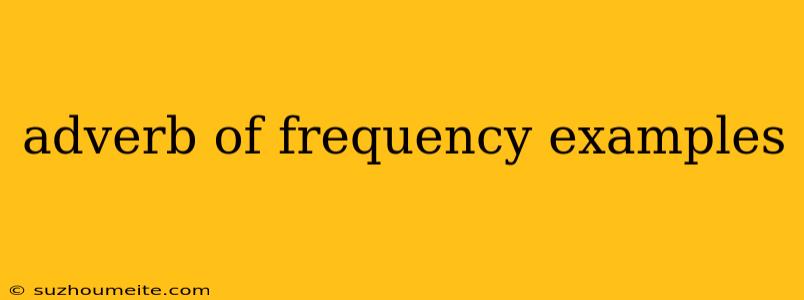Adverbs of Frequency: Examples and Usage
Adverbs of frequency describe how often something happens. They are typically placed before the main verb, but after the auxiliary verb (e.g., be, have, do).
Here are some common adverbs of frequency and their usage with examples:
Always
Definition: Occurs all the time, without exception.
Examples:
- She always wears a hat when she goes outside.
- I always eat breakfast before going to work.
- He always forgets his keys.
Usually
Definition: Happens most of the time.
Examples:
- We usually go to the park on Saturdays.
- My dad usually wakes up early.
- I usually study for an hour every night.
Often
Definition: Happens frequently, but not always.
Examples:
- They often visit their grandparents.
- I often eat out for lunch.
- She often forgets to call me back.
Sometimes
Definition: Happens occasionally, not regularly.
Examples:
- We sometimes go to the cinema on Sundays.
- He sometimes cooks dinner for his family.
- I sometimes wake up late on weekends.
Rarely
Definition: Happens infrequently, almost never.
Examples:
- She rarely drinks coffee.
- They rarely go on vacation.
- I rarely eat fast food.
Never
Definition: Has never happened and will never happen.
Examples:
- I never eat meat.
- He never goes to the beach.
- They never watch TV.
Other Adverbs of Frequency
There are other adverbs of frequency, but they are less common than the ones listed above. These include:
- Frequently: Happens often
- Occasionally: Happens sometimes
- Seldom: Happens rarely
Placement of Adverbs of Frequency
As mentioned earlier, adverbs of frequency typically go before the main verb, but after the auxiliary verb.
- I always go to bed early.
- He has never been to Paris.
- They are usually happy.
Exceptions:
- Adverbs of frequency can come at the beginning of a sentence for emphasis.
- Never again will I eat spicy food.
- Sometimes, I wish I had more time.
By understanding the different adverbs of frequency and their usage, you can express the frequency of events in your writing and speaking with greater accuracy and clarity.
